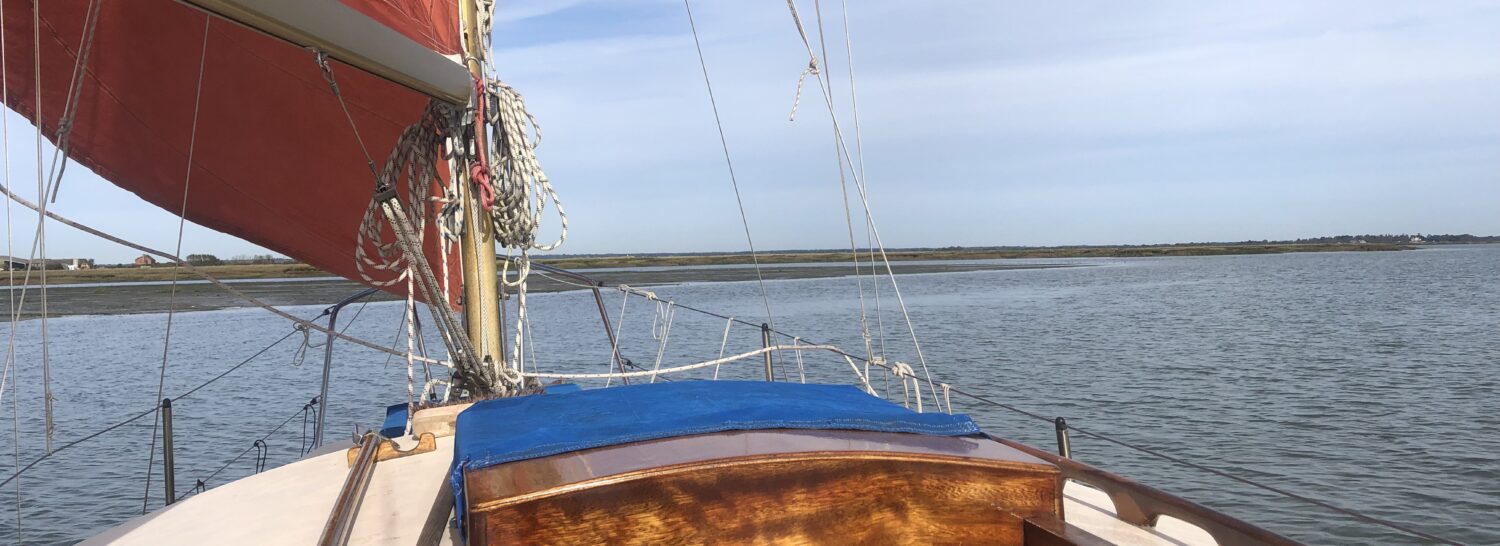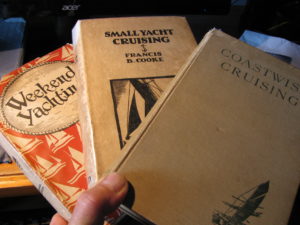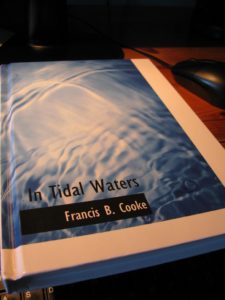I have had a couple of Francis B. Cooke’s books for some while, but found his writing somewhat dry and belittling, condescending even, especially in the way he ‘treated’ women…
Perchance, for part of her Ruby Wedding Anniversary present to me, my good mate and dear wife presented me with: Small Yacht Cruising, Weekend Yachting and, Coastwise Cruising. This last is a fictitious cruise from the Thames (Erith) to Lowestoft, which in many respects mimics without all the ‘map’ detail an earlier book, London to Lowestoft (Also on my shelves…).
A selection of Cooke…
I have another, In Tidal Waters, ordered and on its way … this, I have read is more in the vein of Maurice Griffith’s books – or should that be the other way round for Tidal waters came in 1919.
There is a lot of good sense in much that I have read, up till now, with ‘hints’ galore. If you were a gaff sailor they would be of special use perhaps, but dated in these modern times, however, seamanship does not date – one is always learning!
There is, however, a propensity to repeat things already said. Today, writers have the joys of a computer screen and it is easy to cut stuff out etc.
Francis Cooke began sailing, I believe, at around the age of 7 in 1879. He apparently had his last sail aged 101 and died aged 102. His long term moorings were at North Fambridge on the River Crouch. It was from here he sailed last on his beloved Iolanthe. Cooke was a founding member of the East Coast Mutual Yacht Insurance Association – which is still in operation today.
Francis Cooke did not have any love for the Medway or Swale (I’d like a long chat about this) and left the Thames early in his sailing life for the Crouch, N. Fambridge to be precise. The Thames got ‘too busy’ and it was industrialised. The Medway and Swale were similar, but still had places to sail into, as they have now. he ‘hated’ the way spritsail barges came through moorings to get to quays long used for trade and yet were becoming surrounded by yacht moorings. He literally had not a good word for the ‘humble’ fisherman and his gnarled worked out smack or bawley…
Of boats, he despised the barge-yacht, didn’t care a jot for the centre-boarder and extolled the virtue of a draft around 4′ 6″ – he’d have loved many of the grp wonders around today, surely. I got the impression, because there isn’t a mention of him, that Cooke and Griffiths didn’t see eye to eye … I have mentioned this to a yachting journalist: MG in one of his books (Possibly, Magic of…)mentions a book by a ‘someone’ who he couldn’t remember, about something – a detail about the Southend shore and sketch maps – and a bell has rung in my top hamper. I believe the ‘who’ was Cooke!
Don’t quote me…
For me, the most basic of sailing joys was missing from his life – a Mate. His wife. It was pointedly clear as I read that ‘women’ didn’t figure in his idea of boating. There were certain references to making the cabin arrangements suitable for ladies, should they be carried. Most of his sailing was either carried out alone – which he extolled – with a pal, or sometimes his son (in his younger days). Never, it seems, his wife! I found this extremely sad.
One passage summed up this male domination theme. He commented on the lamentable action of a wife putting petrol in a kettle to boil for tea. The boat blew up. The container was the same as used for water and ‘hubby’ hadn’t marked them…
In Tidal Waters, first published 1919.
Some of the bits one reads mimic a little what was written by Cooke in his book, In Tidal Waters. In this book too, due to the fact that many of the yarns were originally written for the magazine market, a repetition of some details occurs – especially in relation to boat details. This can be ignored!
One has to read these books with the knowledge that Cooke was a Victorian Gentleman who happened to be long lived – into the age of rockets and nuclear fusion and moon landings. But, normally, time changes life perspectives – maybe a later book will include the ‘modern age’ of yachting for he wrote into the early 1960s.
My grandfather who sailed in the early 1930s would have known (of) Cooke, my father too, probably, and they may have even met on the water or at some anchorage.
Another of his ‘ways’ was the hating of solitude at anchor. He disliked the call of the curlew preferring the buzz of a lively harbour shore – especially if there was a golf course handy. I felt that Francis B. Cooke would love todays modern marinas…
If you can find these books, read them for they’re useful, as said, and they certainly tell you what it was like…


